

Nairobi
January 31, 2003
she has died). After "graduating" from Nairobi the elephants are taken down to Tsavo where they are placed into herds of wild elephants which have learned to adopt and teach these orphans how to survive in the wild.
Lamu
February 1-4, 2003
When we arrived to Ali Hippy's home, we were ushered to braided matts on the floor of a cavernous room with cool stone walls. A kerosene lamp provided just enough light to see what it was we were eating and nothing much more. First was crab mandazi (a mandazi is a type of African doughnut--fried and just a touch sweet) that had appropriately earned the name "Ali Yummy Good for Tummy." Next, chapati, which we dipped into a coconut curry sauce. Main course was curried kingfish with coconut rice. A lovely juice made from sweet limes was the perfect finish to the meal. Then Ali and his various friends and family members serenaded us with several traditional Swahili songs; in addition to being a fine cook, Ali was also "the man with the golden voice," as he liked to say.
Another Lamu highlight was our dhow trip to Shela, a village three kilometers to the south of Lamu Town. In the morning Abdallah, our captain, and his two assistants met us at the waterfront and escorted us onto a wooden dhow, the Hodi Hodi. Out of about fifty dhows based out

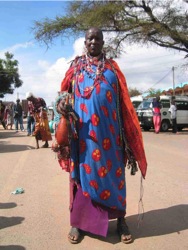
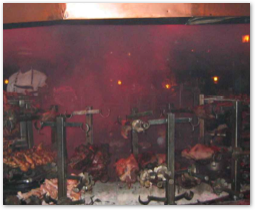

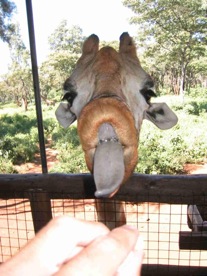

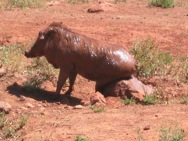

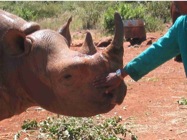

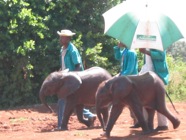
Though we spent almost a week in Nairobi the real highlights occurred on the last two days. Thanks to Kuki and Penda, our very gracious hosts, we had the opportunity to get out of Central Nairobi and check out a couple of the nearby attractions.
First, the Giraffe Centre. We only stopped for 30 minutes but got to feed these giants from a raised platform. Amy, standing back, went first, feeding pellet after pellet onto the 18 inch long tongue protruding from an enormous head. I got a little closer, even scratching one behind the ears. But after getting a good look at the tongue coming at me, I took a step back.
friend (a warthog who was raised with rhinos and doesn't know any better). After a bit the real stars of the show came out, baby elephants ranging from 8 months to 2 years. Each has a keeper who acts like an elephant mother, feeding, bathing and shading the youngster. Since it was Friday, the elephants glistened from their weekly coconut oil rubs. One is covered in blankets, sick with what turns out to be a serious heart condition. (We recently learned that
We then rushed over to the David Sheldrick Wildlife Trust. Here they raise orphaned big game for release back into the wild. When we arrived the resident black rhino was getting his daily mud bath, along with his best
meats on the menu (fortunately giraffe and elephant weren't on the menu that night after our exploits earlier in the day). They keep bringing skewers of ostrich, eland, zebra, beef, pork sausages, lamb and chicken legs, as well as platters of gazelle meatballs until your gut bursts, or you lower the flag in surrender. We opted to surrender, though I was near bursting. Retiring back to our room we slept like lions after the kill.
--Z
That night we ventured back to the outskirts of Nairobi, this time in the company of Kuki and Penda. The adventure was culinary, exploring new varieties of meat and our capacity to eat. Destination: Carnivore, an all you can eat nyama choma (grilled meat) restaurant with a huge open barbecue pit and 10 different

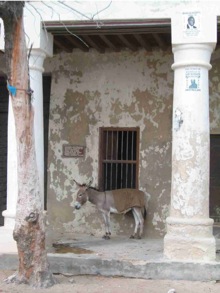
We were high above the Kenyan Coast making our descent towards Lamu Island, the cradle of Swahili culture. As our tiny jet-propelled plane touched down onto the airstrip at Manda (the island to the near east of Lamu), a funny thing happened. Our landing was aborted and we were immediately launched back into the sky. Some cows had seen our impending arrival as an opportune time to meander across the runway. We circled over the archipelago as our pilot conservatively estimated the amount of time it takes for a herd of cows to cross a road, and then we descended once more. The airport at Lamu was made up of an airstrip, a thatched roof suspended by bamboo poles (air traffic control, check-in, ticketing, security, waiting lounge), and a wheelbarrow (baggage claim).
We took a ferry across a small channel to Lamu Town and was greeted by plenty of touts offering a myriad of services ranging from dhow rides to donkey hires (as there are no cars on the island). "Sir, I have donkey. Madam, do you like to fish? Where are you from? I find you nice hotel." After a lunch of grilled snapper and kingfish, coconut rice, and fresh squeezed mango, papaya, and passion fruit juices, we started our exploration of town. We passed through narrow, crooked lanes lined with two- to three-story stone buildings in varying degrees of dilapidation; slipped by mosques and imposing carved wood doors; dodged donkeys
wearing special saddle bags made of braided palm leaves that were filled with coral bricks, a variety of produce, or bags of grain; and walked amongst men in kofias (embroidered skull caps) and kanzus (long white robes) and women in kangas (colorful wraps) and bui-buis.
We became increasingly adroit at dodging touts, but at one point there was a voice calling out to us, "Hello travellers!" that was so distinctive, it compelled us to turn around. He was an older man, short and stout, with kofia, kanzu, cane, and a wonderfully expressive face. This was Ali Hippy--we had read about him in our Lonely Planet guide. For the past 30-or-so years, Ali Hippy has been roaming the streets of Lamu, enticing tourists by inviting them to his home for an authentic (and fairly priced) Swahili meal. For two people who are ruled by their stomachs, it was a pretty easy sell.

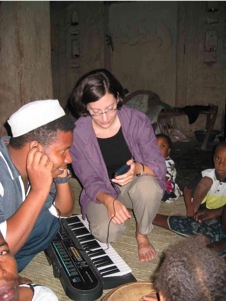
Apparently, it was too late in the morning for fishing, yet too early to catch the strong breezes that hit the island mid-day and stay until evening. As we had nowhere we had to be, at no particular time, it made little difference to us which direction or how strong the wind blew. Around 11:30 it picked up and our drifting immediately evolved into sailing. Distances on Lamu Island are short and we were at Shela within minutes, so we made a U-turn, sailed back towards Lamu Town for a while, then circled around once more and were eventually deposited on the white sand beaches of Shela, where we spent the afternoon. All in all, not a bad way to spend four days!
--A

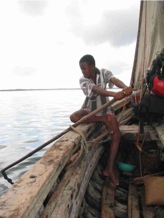

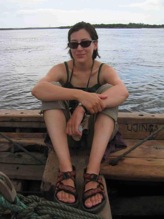
of Lamu, very few were out
sailing.
Photographs and Text: Copyright 2002 & 2003, Zachary Maler & Amy Leffert